
AMD Ryzen 9 5950X vs Intel Core i9-11900K
Last updated:
CPU comparison with benchmarks
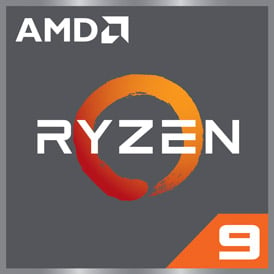
|
 |
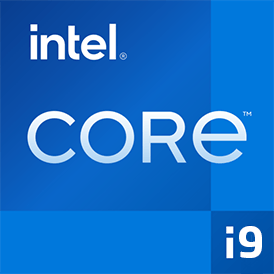
|
| AMD Ryzen 9 5950X | Intel Core i9-11900K | |
CPU comparisonAMD Ryzen 9 5950X or Intel Core i9-11900K - which processor is faster? In this comparison we look at the differences and analyze which of these two CPUs is better. We compare the technical data and benchmark results.
The AMD Ryzen 9 5950X has 16 cores with 32 threads and clocks with a maximum frequency of 4.90 GHz. Up to 128 GB of memory is supported in 2 memory channels. The AMD Ryzen 9 5950X was released in Q4/2020. The Intel Core i9-11900K has 8 cores with 16 threads and clocks with a maximum frequency of 5.30 GHz. The CPU supports up to 128 GB of memory in 2 memory channels. The Intel Core i9-11900K was released in Q1/2021. |
||
| AMD Ryzen 9 (35) | Family | Intel Core i9 (78) |
| AMD Ryzen 5000 (12) | CPU group | Intel Core i 11000 (22) |
| 4 | Generation | 11 |
| Vermeer (Zen 3) | Architecture | Rocket Lake S |
| Desktop / Server | Segment | Desktop / Server |
| AMD Ryzen 9 3950X | Predecessor | Intel Core i9-10900K |
| AMD Ryzen 9 7950X | Successor | Intel Core i9-12900K |
|
|
||
CPU Cores and Base FrequencyThe AMD Ryzen 9 5950X has 16 CPU cores and can calculate 32 threads in parallel. The clock frequency of the AMD Ryzen 9 5950X is 3.40 GHz (4.90 GHz) while the Intel Core i9-11900K has 8 CPU cores and 16 threads can calculate simultaneously. The clock frequency of the Intel Core i9-11900K is at 3.50 GHz (5.30 GHz). |
||
| AMD Ryzen 9 5950X | Characteristic | Intel Core i9-11900K |
| 16 | Cores | 8 |
| 32 | Threads | 16 |
| normal | Core architecture | normal |
| Yes | Hyperthreading | Yes |
| Yes | Overclocking ? | Yes |
| 3.40 GHz | Frequency | 3.50 GHz |
| 4.90 GHz | Turbo Frequency (1 Core) | 5.30 GHz |
| 4.20 GHz | Turbo Frequency (All Cores) | 4.80 GHz |
Internal GraphicsThe AMD Ryzen 9 5950X or Intel Core i9-11900K has integrated graphics, called iGPU for short. The iGPU uses the system's main memory as graphics memory and sits on the processor's die. |
||
| no iGPU | GPU | Intel UHD Graphics 750 |
| GPU frequency | 0.35 GHz | |
| -- | GPU (Turbo) | 1.30 GHz |
| -- | GPU Generation | 12 |
| Technology | 14 nm | |
| Max. displays | 3 | |
| -- | Compute units | 32 |
| -- | Shader | 256 |
| No | Hardware Raytracing | No |
| No | Frame Generation | No |
| -- | Max. GPU Memory | 64 GB |
| -- | DirectX Version | 12 |
Hardware codec supportA photo or video codec that is accelerated in hardware can greatly accelerate the working speed of a processor and extend the battery life of notebooks or smartphones when playing videos. |
||
| no iGPU | GPU | Intel UHD Graphics 750 |
| No | Codec h265 / HEVC (8 bit) | Decode / Encode |
| No | Codec h265 / HEVC (10 bit) | Decode / Encode |
| No | Codec h264 | Decode / Encode |
| No | Codec VP9 | Decode / Encode |
| No | Codec VP8 | Decode |
| No | Codec AV1 | Decode |
| No | Codec AVC | Decode / Encode |
| No | Codec VC-1 | Decode |
| No | Codec JPEG | Decode / Encode |
Memory & PCIeThe AMD Ryzen 9 5950X can use up to 128 GB of memory in 2 memory channels. The maximum memory bandwidth is 51.2 GB/s. The Intel Core i9-11900K supports up to 128 GB of memory in 2 memory channels and achieves a memory bandwidth of up to 51.2 GB/s. |
||
| AMD Ryzen 9 5950X | Characteristic | Intel Core i9-11900K |
| DDR4-3200 | Memory | DDR4-3200 |
| 128 GB | Max. Memory | 128 GB |
| 2 (Dual Channel) | Memory channels | 2 (Dual Channel) |
| 51.2 GB/s | Max. Bandwidth | 51.2 GB/s |
| Yes | ECC | No |
| 8.00 MB | L2 Cache | 4.00 MB |
| 64.00 MB | L3 Cache | 16.00 MB |
| 4.0 | PCIe version | 4.0 |
| 20 | PCIe lanes | 20 |
| 39.4 GB/s | PCIe Bandwidth | 39.4 GB/s |
Thermal ManagementThe thermal design power (TDP for short) of the AMD Ryzen 9 5950X is 105 W, while the Intel Core i9-11900K has a TDP of 125 W. The TDP specifies the necessary cooling solution that is required to cool the processor sufficiently. |
||
| AMD Ryzen 9 5950X | Characteristic | Intel Core i9-11900K |
| 105 W | TDP (PL1 / PBP) | 125 W |
| 142 W | TDP (PL2) | 251 W @ 56 s |
| -- | TDP up | -- |
| -- | TDP down | 95 W |
| 95 °C | Tjunction max. | 100 °C |
Technical detailsThe AMD Ryzen 9 5950X is manufactured in 7 nm and has 72.00 MB cache. The Intel Core i9-11900K is manufactured in 14 nm and has a 20.00 MB cache. |
||
| AMD Ryzen 9 5950X | Characteristic | Intel Core i9-11900K |
| 7 nm | Technology | 14 nm |
| Chiplet | Chip design | Monolithic |
| x86-64 (64 bit) | Instruction set (ISA) | x86-64 (64 bit) |
| SSE4a, SSE4.1, SSE4.2, AVX2, FMA3 | ISA extensions | SSE4.1, SSE4.2, AVX2, AVX-512 |
| AM4 (PGA 1331) | Socket | LGA 1200 |
| AMD-V, SVM | Virtualization | VT-x, VT-x EPT, VT-d |
| Yes | AES-NI | Yes |
| Windows 10, Windows 11, Linux | Operating systems | Windows 10, Windows 11, Linux |
| Q4/2020 | Release date | Q1/2021 |
| 799 $ | Release price | 539 $ |
| show more data | show more data | |
Rate these processors
Average performance in benchmarks
⌀ Single core performance in 6 CPU benchmarks
⌀ Multi core performance in 8 CPU benchmarks
Cinebench R23 (Single-Core)
Cinebench R23 is the successor of Cinebench R20 and is also based on the Cinema 4 Suite. Cinema 4 is a worldwide used software to create 3D forms. The single-core test only uses one CPU core, the amount of cores or hyperthreading ability doesn't count.
|
|
AMD Ryzen 9 5950X
16C 32T @ 4.90 GHz |
||
|
|
Intel Core i9-11900K
8C 16T @ 5.30 GHz |
||
Cinebench R23 (Multi-Core)
Cinebench R23 is the successor of Cinebench R20 and is also based on the Cinema 4 Suite. Cinema 4 is a worldwide used software to create 3D forms. The multi-core test involves all CPU cores and taks a big advantage of hyperthreading.
|
|
AMD Ryzen 9 5950X
16C 32T @ 4.20 GHz |
||
|
|
Intel Core i9-11900K
8C 16T @ 4.80 GHz |
||
Geekbench 5, 64bit (Single-Core)
Geekbench 5 is a cross plattform benchmark that heavily uses the systems memory. A fast memory will push the result a lot. The single-core test only uses one CPU core, the amount of cores or hyperthreading ability doesn't count.
|
|
AMD Ryzen 9 5950X
16C 32T @ 4.90 GHz |
||
|
|
Intel Core i9-11900K
8C 16T @ 5.30 GHz |
||
Geekbench 5, 64bit (Multi-Core)
Geekbench 5 is a cross plattform benchmark that heavily uses the systems memory. A fast memory will push the result a lot. The multi-core test involves all CPU cores and taks a big advantage of hyperthreading.
|
|
AMD Ryzen 9 5950X
16C 32T @ 4.20 GHz |
||
|
|
Intel Core i9-11900K
8C 16T @ 4.80 GHz |
||
Geekbench 6 (Single-Core)
Geekbench 6 is a benchmark for modern computers, notebooks and smartphones. What is new is an optimized utilization of newer CPU architectures, e.g. based on the big.LITTLE concept and combining CPU cores of different sizes. The single-core benchmark only evaluates the performance of the fastest CPU core, the number of CPU cores in a processor is irrelevant here.
|
|
AMD Ryzen 9 5950X
16C 32T @ 4.90 GHz |
||
|
|
Intel Core i9-11900K
8C 16T @ 5.30 GHz |
||
Geekbench 6 (Multi-Core)
Geekbench 6 is a benchmark for modern computers, notebooks and smartphones. What is new is an optimized utilization of newer CPU architectures, e.g. based on the big.LITTLE concept and combining CPU cores of different sizes. The multi-core benchmark evaluates the performance of all of the processor's CPU cores. Virtual thread improvements such as AMD SMT or Intel's Hyper-Threading have a positive impact on the benchmark result.
|
|
AMD Ryzen 9 5950X
16C 32T @ 4.20 GHz |
||
|
|
Intel Core i9-11900K
8C 16T @ 4.80 GHz |
||
Cinebench R20 (Single-Core)
Cinebench R20 is the successor of Cinebench R15 and is also based on the Cinema 4 Suite. Cinema 4 is a worldwide used software to create 3D forms. The single-core test only uses one CPU core, the amount of cores or hyperthreading ability doesn't count.
|
|
AMD Ryzen 9 5950X
16C 32T @ 4.90 GHz |
||
|
|
Intel Core i9-11900K
8C 16T @ 5.30 GHz |
||
Cinebench R20 (Multi-Core)
Cinebench R20 is the successor of Cinebench R15 and is also based on the Cinema 4 Suite. Cinema 4 is a worldwide used software to create 3D forms. The multi-core test involves all CPU cores and taks a big advantage of hyperthreading.
|
|
AMD Ryzen 9 5950X
16C 32T @ 4.20 GHz |
||
|
|
Intel Core i9-11900K
8C 16T @ 4.80 GHz |
||
Blender 3.1 Benchmark
In the Blender Benchmark 3.1, the scenes "monster", "junkshop" and "classroom" are rendered and the time required by the system is measured. In our benchmark we test the CPU and not the graphics card. Blender 3.1 was presented as a standalone version in March 2022.
|
|
AMD Ryzen 9 5950X
16C 32T @ 4.20 GHz |
||
|
|
Intel Core i9-11900K
8C 16T @ 4.80 GHz |
||
Estimated results for PassMark CPU Mark
Some of the CPUs listed below have been benchmarked by CPU-monkey. However the majority of CPUs have not been tested and the results have been estimated by a CPU-monkey’s secret proprietary formula. As such they do not accurately reflect the actual Passmark CPU mark values and are not endorsed by PassMark Software Pty Ltd.
|
|
AMD Ryzen 9 5950X
16C 32T @ 4.20 GHz |
||
|
|
Intel Core i9-11900K
8C 16T @ 4.80 GHz |
||
CPU-Z Benchmark 17 (Single-Core)
The CPU-Z benchmark measures a processor's performance by measuring the time it takes the system to complete all benchmark calculations. The faster the benchmark is completed, the higher the score.
|
|
AMD Ryzen 9 5950X
16C 32T @ 4.20 GHz |
||
|
|
Intel Core i9-11900K
8C 16T @ 4.80 GHz |
||
CPU-Z Benchmark 17 (Multi-Core)
The CPU-Z benchmark measures a processor's performance by measuring the time it takes the system to complete all benchmark calculations. The faster the benchmark is completed, the higher the score.
|
|
AMD Ryzen 9 5950X
16C 32T @ 3.40 GHz |
||
|
|
Intel Core i9-11900K
8C 16T @ 3.50 GHz |
||
Cinebench R15 (Single-Core)
Cinebench R15 is the successor of Cinebench 11.5 and is also based on the Cinema 4 Suite. Cinema 4 is a worldwide used software to create 3D forms. The single-core test only uses one CPU core, the amount of cores or hyperthreading ability doesn't count.
|
|
AMD Ryzen 9 5950X
16C 32T @ 4.90 GHz |
||
|
|
Intel Core i9-11900K
8C 16T @ 5.30 GHz |
||
Cinebench R15 (Multi-Core)
Cinebench R15 is the successor of Cinebench 11.5 and is also based on the Cinema 4 Suite. Cinema 4 is a worldwide used software to create 3D forms. The multi-core test involves all CPU cores and taks a big advantage of hyperthreading.
|
|
AMD Ryzen 9 5950X
16C 32T @ 4.20 GHz |
||
|
|
Intel Core i9-11900K
8C 16T @ 4.80 GHz |
||
Cinebench 2024 (Single-Core)
The Cinebench 2024 benchmark is based on the Redshift rendering engine, which is also used in Maxon's 3D program Cinema 4D. The benchmark runs are each 10 minutes long to test whether the processor is limited by its heat generation.
|
|
AMD Ryzen 9 5950X
16C 32T @ 4.90 GHz |
||
|
|
Intel Core i9-11900K
8C 16T @ 5.30 GHz |
||
Cinebench 2024 (Multi-Core)
The Multi-Core test of the Cinebench 2024 benchmark uses all cpu cores to render using the Redshift rendering engine, which is also used in Maxons Cinema 4D. The benchmark run is 10 minutes long to test whether the processor is limited by its heat generation.
|
|
AMD Ryzen 9 5950X
16C 32T @ 4.90 GHz |
||
|
|
Intel Core i9-11900K
8C 16T @ 5.30 GHz |
||
iGPU - FP32 Performance (Single-precision GFLOPS)
The theoretical computing performance of the internal graphics unit of the processor with simple accuracy (32 bit) in GFLOPS. GFLOPS indicates how many billion floating point operations the iGPU can perform per second.
|
|
AMD Ryzen 9 5950X
@ 0.00 GHz |
||
|
|
Intel Core i9-11900K
Intel UHD Graphics 750 @ 1.30 GHz |
||
CPU performance per watt (efficiency)
Efficiency of the processor under full load in the Cinebench R23 (multi-core) benchmark. The benchmark result is divided by the average energy required (CPU package power in watts). The higher the value, the more efficient the CPU is under full load.
|
|
AMD Ryzen 9 5950X
28,577 CB R23 MC @ 153 W |
||
|
|
Intel Core i9-11900K
3.50 GHz |
||
Devices using this processor |
|
| AMD Ryzen 9 5950X | Intel Core i9-11900K |
| Unknown | Unknown |
News and articles for the AMD Ryzen 9 5950X and the Intel Core i9-11900K
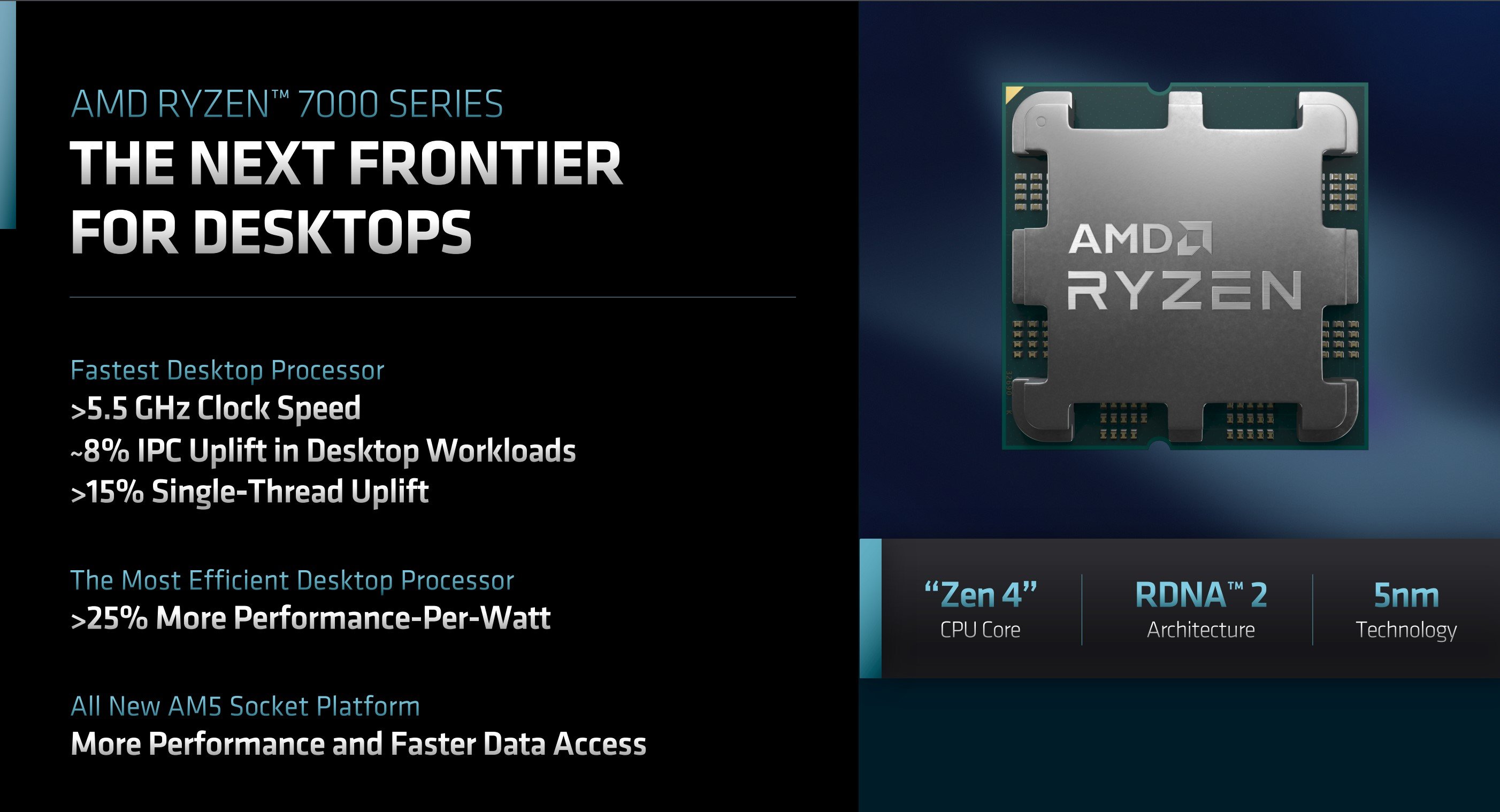
Why the new AMD Ryzen 7000 processors for the AM5 socket are currently not a good deal
Posted by Stefan on 2022-10-11
At the end of September 2022, the time had come: AMD presented its latest desktop processors called AMD Ryzen 7000. Initially, 4 processors with 6 to 16 CPU cores were released.
The new socket AM5 (LGA 1718) is used for the first time, which is intended to replace the very durable socket AM4 introduced in 2017 as AMDs mainstream platform. This includes (depending on the chipset) PCIe 5.0 support as well as the exclusive use of DDR5 memory on all AM5 mainboards.
Officially, DDR5-5200 is the maximum, but with AMDs EXPO Technology which is similar to Intel's XMP 3.0, AMD now also has a solution for easy overclocking of the main memory. AMD itself names DDR5-6000 as the sweet spot for the new AMD Ryzen 7000 processors.
The new socket AM5 (LGA 1718) is used for the first time, which is intended to replace the very durable socket AM4 introduced in 2017 as AMDs mainstream platform. This includes (depending on the chipset) PCIe 5.0 support as well as the exclusive use of DDR5 memory on all AM5 mainboards.
Officially, DDR5-5200 is the maximum, but with AMDs EXPO Technology which is similar to Intel's XMP 3.0, AMD now also has a solution for easy overclocking of the main memory. AMD itself names DDR5-6000 as the sweet spot for the new AMD Ryzen 7000 processors.
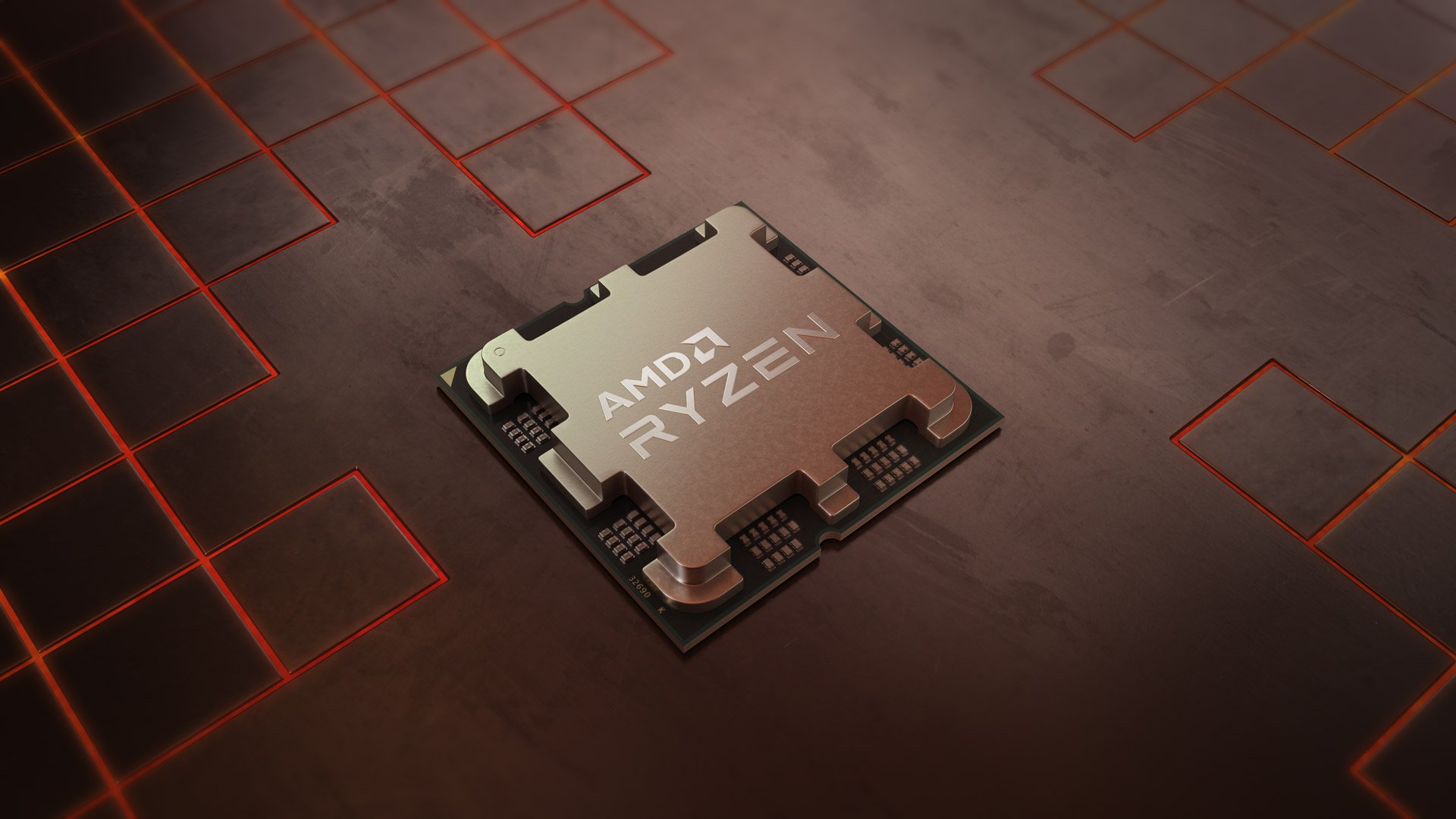
The evolution of AMD Ryzen processors
Posted by Stefan on 2022-09-06
The AMD Ryzen processors are designed for the mid to high-end range and are grouped into the Ryzen 3, Ryzen 5, Ryzen 7 and Ryzen 9 classes. AMD follows the market leader Intel, which groups its Core i series (Intel Core i3, Core i5, Core i7 and Core i9) identically.
The AMD Ryzen processors were first introduced by AMD in Q1 2017. They are the successor to the not particularly successful AMD Bulldozer processors. The latter were manufactured using an outdated manufacturing process and could not keep up with the competing products from Intel. AMD lost a large portion of its desktop processor market share during this period.
The AMD Ryzen processors were first introduced by AMD in Q1 2017. They are the successor to the not particularly successful AMD Bulldozer processors. The latter were manufactured using an outdated manufacturing process and could not keep up with the competing products from Intel. AMD lost a large portion of its desktop processor market share during this period.
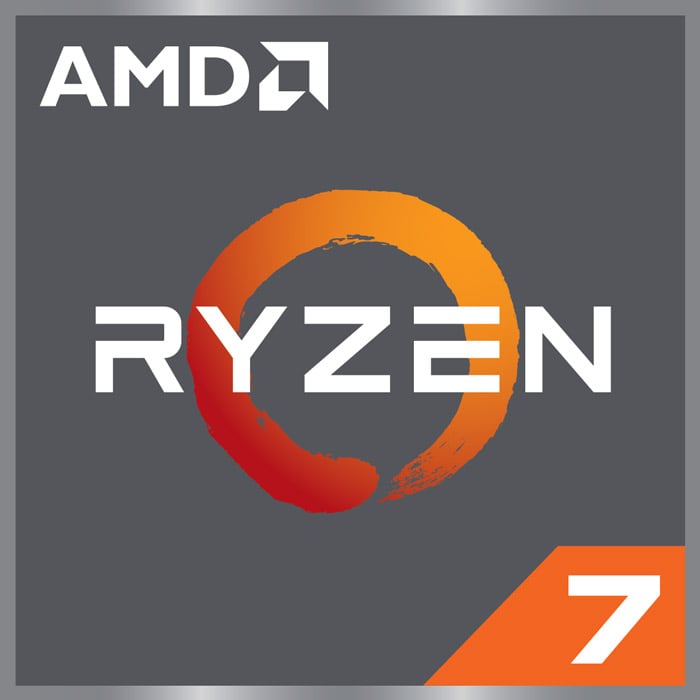
AMD Ryzen 5 7600X and AMD Ryzen 7 7800X are coming in September
Posted by Stefan on 2022-06-20
After we published a performance assessment of the AMD Ryzen 9 7950X last week, the well-known AMD leaker Greymon55 has now posted more informations via Twitter.
He predicts the first four models of the new Zen 4 desktop generation, which AMD would like to present at the end of 2022. There is also an alleged release date of September 15, 2022.
He predicts the first four models of the new Zen 4 desktop generation, which AMD would like to present at the end of 2022. There is also an alleged release date of September 15, 2022.

AMD Ryzen 9 7950X - Cinebench R23 Benchmark projection
Posted by Stefan on 2022-06-10
We give you a preview of AMD's new Zen 4 desktop processors and calculate the performance of the AMD Ryzen 9 7950X top model for the new AM5 socket. The performance data and other technical details come directly from the press kit that AMD released as part of its Financial Analyst Day on June 9, 2022.
Up to 15 percent more single-core performance and 35 percent more multi-core performance of the 16-core model are realistic !
Up to 15 percent more single-core performance and 35 percent more multi-core performance of the 16-core model are realistic !
Comparison of the two processors
AMD Ryzen 9 5950X has 16 CPU cores and can process up to 32 threads in parallel using simultaneous multi-threading. The desktop processor is AMD's largest expansion stage for the mainstream socket AM4. The clock frequency is 3.4 GHz, but the AMD Ryzen 9 5950X can increase the clock frequency up to 4.2 GHz (utilization of all CPU cores) or even 4.9 GHz in single-core operation.The Intel Core i9-11900K clocks its 8 CPU cores with 3.5 GHz in the base, but can also adjust its clock frequency dynamically. In turbo mode, 4.8 GHz are possible when all cores are loaded or even a very high 5.3 GHz when only one CPU core is loaded. The i9 also benefits from Hyper-Threading and can therefore process 16 threads in parallel.
Both processors have a free multiplier and can therefore be overclocked. The AMD Ryzen 9 5950X also has a 64 MB level 3 cache, while Intel has given the Intel Core i9-11900K only 16 MB. The maximum amount of RAM on both systems is 128 GB, with both processors being approved for DDR4-3200. With overclocking, significantly higher clock frequencies of the main memory are possible on both systems, DDR4-3600 is actually always achievable.
Despite its 16 cores, the AMD Ryzen 9 5950X has a lower TDP of 105 watts than Intel's Core i9-11900K, which is specified as 125 watts. This is mainly due to the significantly better energy efficiency of the AMD processor. Its "Zen 3" CPU cores are already being produced in a modern 7 nm process, while Intel is still using a (greatly improved) 14 nm production process. The "Rocket Lake" processors, to which the Intel Core i9-11900K belongs, were originally supposed to be manufactured in 10 nm. Due to delivery bottlenecks, Intel had to port this architecture to 14 nm via backport.
Popular comparisons containing this CPUs
back to index










